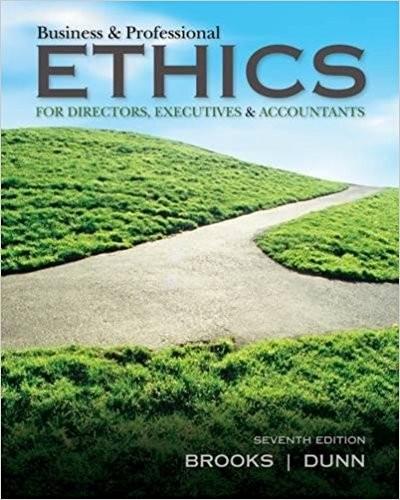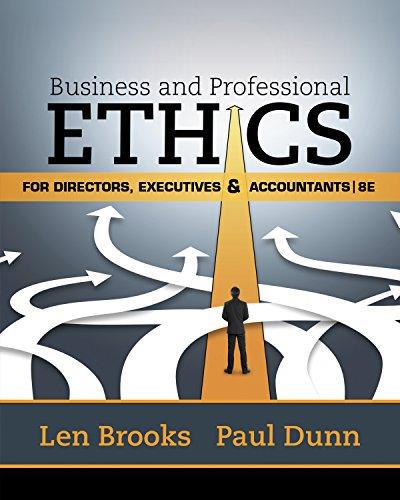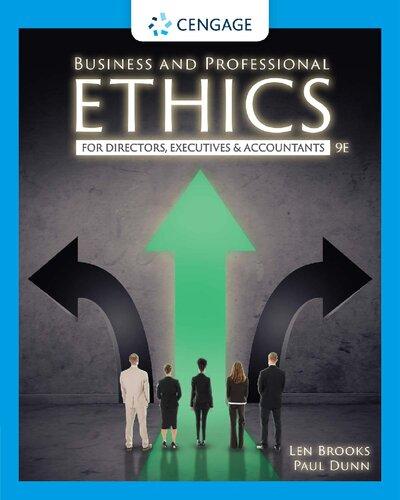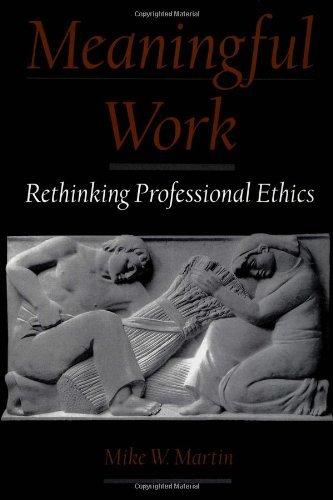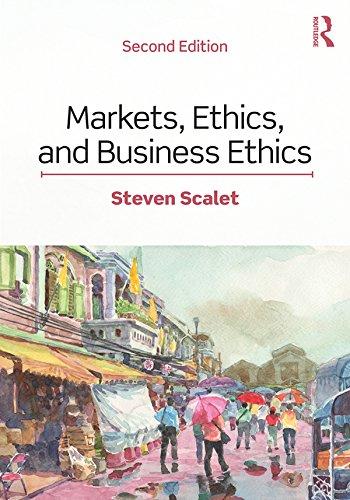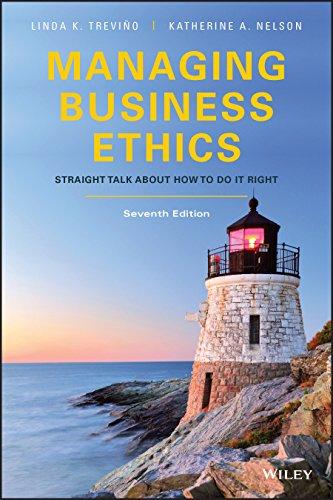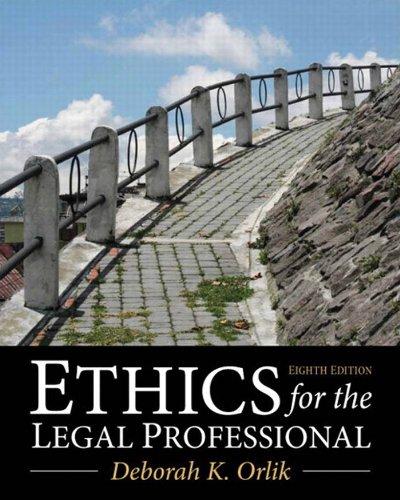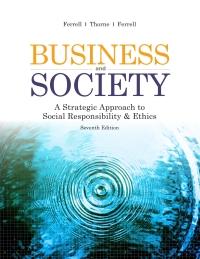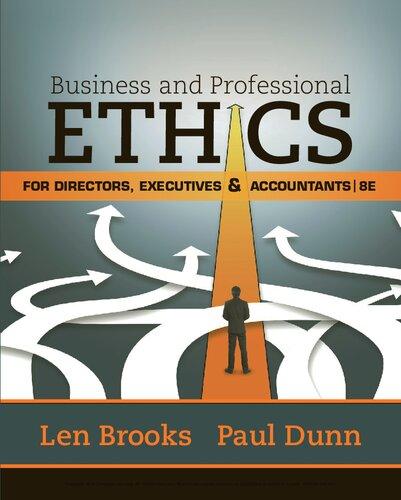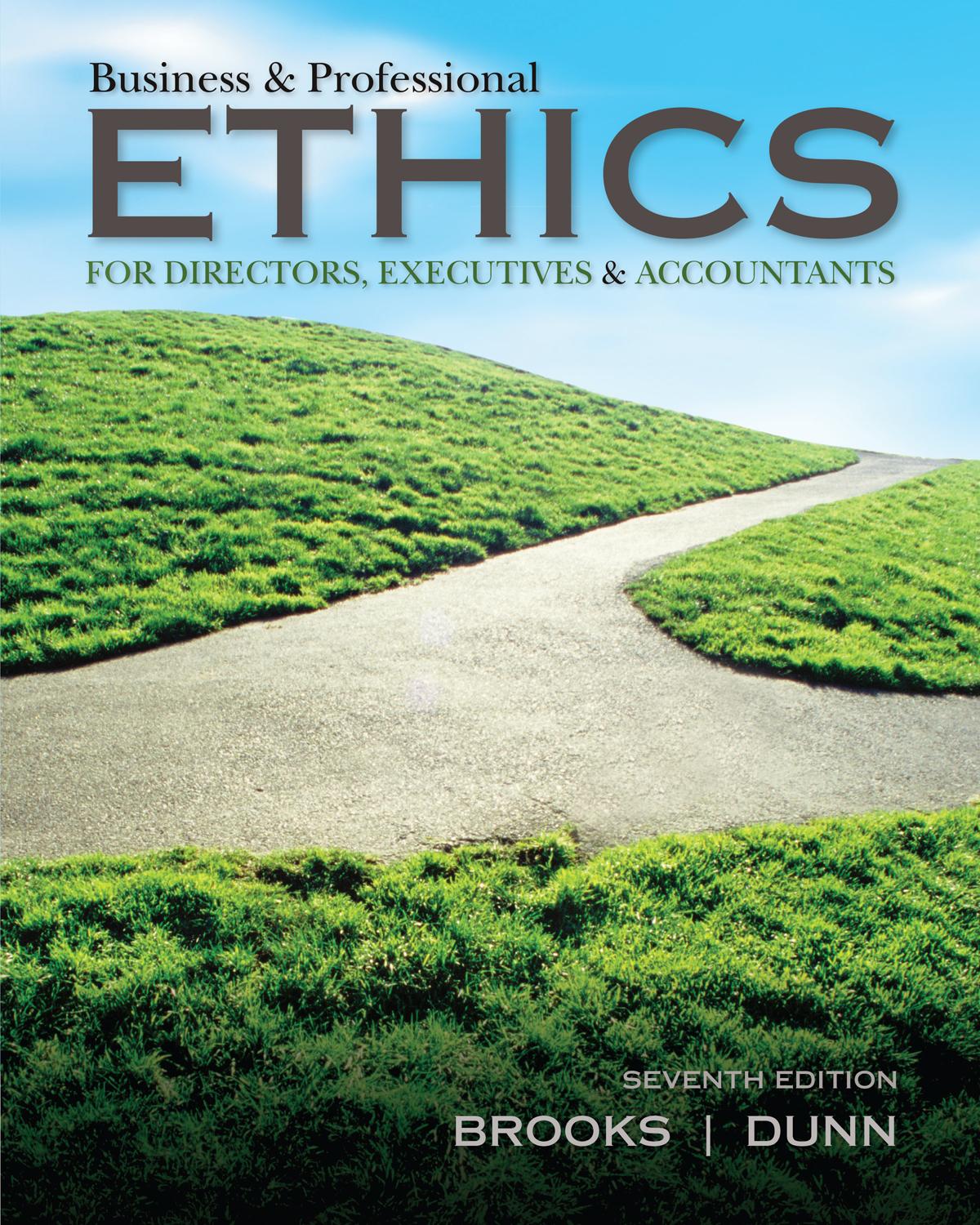Visit to download the full and correct content document: https://ebookmass.com/product/ebook-pdf-business-professional-ethics-7th-edition/
More products digital (pdf, epub, mobi) instant download maybe you interests ...
Business & Professional Ethics for Directors, Executives & Accountants 8th Edition, (Ebook PDF)
https://ebookmass.com/product/business-professional-ethics-fordirectors-executives-accountants-8th-edition-ebook-pdf/
Business and Professional Ethics 9th Edition Leonard J. Brooks
https://ebookmass.com/product/business-and-professionalethics-9th-edition-leonard-j-brooks/
Meaningful Work: Rethinking Professional Ethics (Practical and Professional Ethics) 1st Edition, (Ebook PDF)
https://ebookmass.com/product/meaningful-work-rethinkingprofessional-ethics-practical-and-professional-ethics-1stedition-ebook-pdf/
Professional Baking, 7th Edition 7th Edition – Ebook PDF Version
https://ebookmass.com/product/professional-baking-7thedition-7th-edition-ebook-pdf-version/
Markets, Ethics, and Business Ethics 2nd Edition, (Ebook PDF)
https://ebookmass.com/product/markets-ethics-and-businessethics-2nd-edition-ebook-pdf/
Managing Business Ethics: Straight Talk about How to Do It Right, 7th Edition 7th Edition – Ebook PDF Version
https://ebookmass.com/product/managing-business-ethics-straighttalk-about-how-to-do-it-right-7th-edition-7th-edition-ebook-pdfversion/
Ethics for the Legal Professional 8th Edition, (Ebook PDF)
https://ebookmass.com/product/ethics-for-the-legalprofessional-8th-edition-ebook-pdf/
(eBook PDF) Business and Society: A Strategic Approach to Social Responsibility & Ethics, 7th edition
https://ebookmass.com/product/ebook-pdf-business-and-society-astrategic-approach-to-social-responsibility-ethics-7th-edition/
Business and professional ethics for directors, executives, and accountants 8th Edition Len Brooks
https://ebookmass.com/product/business-and-professional-ethicsfor-directors-executives-and-accountants-8th-edition-len-brooks/
PREFACExiii
OVERVIEWOFTHEBOOKxxiii
CHAPTER1 ETHICSEXPECTATIONS1 TheEthicsEnvironmentforBusiness:The BattleforCredibility,Reputation& CompetitiveAdvantage 1
EnvironmentalConcerns 2
MoralSensitivity 3
BadJudgments&ActivistStakeholders 4
Economic&CompetitivePressures 5
FinancialScandals:TheExpectationsGap& theCredibilityGap 6
GovernanceFailures&RiskAssessment 6
IncreasedAccountability&Transparency Desired 7
SynergyamongFactors&Institutional Reinforcement 8 Outcomes 9
NewExpectationsforBusiness 9
NewMandateforBusiness 9
NewGovernance&Accountability Frameworks 11
ReinforcedFiduciaryRoleforProfessional Accountants 11
Responses&Developments 12
EmergingGovernance&Stakeholder
AccountabilityModels 12
ManagementBasedonValues,Reputation,& Risks 16
Accountability 18
EthicalBehavior&DevelopmentsinBusiness Ethics 19
TheEthicsEnvironmentforProfessional Accountants 22
Role&Conduct 22
Governance 23
ServicesOffered 24
ManagingEthicsRisks& Opportunities 24
DevelopingaCultureofIntegrity 24
CorporateGovernance 25
Questions 27
ReadingInsights 27
References 28
CaseInsights 29
ETHICSCASES:
CasesInvolvingImproperBehavior
PedophilePriestsintheCatholicChurch30
SexualAbusebyaPennStateFootball Coach31
LIBORManipulationsCauseWidespreadImpacts locatedinChapter2
Advertising&SalesPromotionCases
Pepsi’siPhoneAppStereotypesWomen32 ShouldPornbeSoldbyCellPhone Companies?33
VirginMobile’sStrip2ClotheCampaign: Exploitive,RisquéandWorthwhile?34
CasesInvolvingFinancialTransactions GoldmanSachsandTheGreekVeil35 MarthaStewart’sLostReputation36
CasesInvolvingtheControlofInformation GoogleversusChina41 China’sTaintedBabyMilkPowder:Rumored ControlofOnlineNews42
CasesConcerningtheEnvironment Bhopal-UnionCarbide44 Texaco:TheEcuadorIssue47
ProductSafetyCases TheBetaseron® Decision(A)49 MagneticToysCanHurt51 Bausch&Lomb’sHazardousContactLens Cleaner52
Accounting&AuditingCases WhereWeretheAccountants?53 ToResignorServe?54
READINGS:
ANDREWW.SINGER: TheWhistle-Blower: PatriotorBountyHunter?55
L.J.BROOKS: LawCaseSummary:Caremark NationalInc.62
CHAPTER2 ETHICS&GOVERNANCESCANDALS64
Ethics&Governance:ATimelineof ImportantEvents 65
Ethics&Governance:TheEarly DevelopmentsPriorto1970 66
Ethics&Governance:1970–1990 67
Ethics&Governance:TheModernEra— 1990tothePresent 68
SignificantEthics&Governance Scandals&Events 68
Enron AFailureoftheBoardof Directors 68
ArthurAndersen AnOrganizationalCulture GoneAwry 71
WorldCom PowerintheHandsofOne Man 72
CrisisofConfidence 73
Sarbanes-OxleyAct ClosingtheBarn Door 74
TaxShelters NotinthePublicInterest 76
SubprimeMortgageMeltdown Greed withoutDueDiligence 77
Dodd-FrankWallStreetReformand ConsumerProtectionAct 81
BernardMadoff IfIt’sTooGoodtoBe True 81
PublicDisillusionment:TheOccupy Movement 82
ShareholderDisillusionment:Shareholder Resolutions 84
LIBORScandal:HowBanksManipulateda BenchmarkInterestRate 84 HowtheLIBORScandalCametoLight 86 ExamplesofLossesCausedbyLIBOR Manipulations 87
BriberyAttractsProsecutions&Huge Fines 88
SignsofEthicalCollapse 89
Ethics&Governance:Trends 90
Ethics&Governance:Timetablesof ImportantEvents,1929–2013 90
UsefulVideo&Films 92
Questions 92
References 93
CaseInsights 93
ETHICSCASES: Enron’sQuestionableTransactions93
ArthurAndersen’sTroubles98
WorldCom:TheFinalCatalyst106
BernieMadoffScandal TheKingofPonzi Schemes112 Wal-MartBriberyinMexico122
LIBORManipulationsCauseWidespread Impacts124
CHAPTER3 ETHICALBEHAVIOR PHILOSOPHERS ’ CONTRIBUTIONS127
Ethics&MoralCodes 128
Ethics&Business 130
Self-Interest&Economics 131
Ethics,Business&TheLaw 134
MajorEthicalTheoriesUsefulin ResolvingEthicalDilemmas 135
Teleology:Utilitarianism&Consequentialism ImpactAnalysis 135
DeontologicalEthics Motivationfor Behavior 141
Justice&Fairness Examiningthe Balance 143
VirtueEthics AnalysisoftheVirtue Expected 148
MoralImagination 150 Questions 150 CaseInsights 151
UsefulVideo&Film 151 References 152
ETHICSCASES: AnIllustrationofEthicalDecisionMaking152 GenderDiscriminationatIKEA155 DecidingWhoReceivestheSwineFlu Vaccine156
InsuranceandGeneticallyInherited Diseases157
TerroristPayments158 TheCaseofCesarCorreia159
CHAPTER4 PRACTICALETHICALDECISIONMAKING161
Introduction 161
MotivatingDevelopmentsforEthical Learning 162
EthicalDecisionMakingFramework (EDM) AnOverview 162
PhilosophicalApproaches—AnOverview: Consequentialism(Utilitarianism), Deontology,&VirtueEthics 164
Consequentialism,Utilitarianism,or Teleology 165
Deontology 166
VirtueEthics 167
SniffTests&CommonHeuristics
PreliminaryTestsofEthicality 169
StakeholderImpactAnalysis ComprehensiveToolforAssessing Decisions&Actions 170
Overview 170
FundamentalInterestsofStakeholders 172 MeasurementofQuantifiableImpacts 173 AssessmentofNon-Quantifiable Impacts 177
StakeholderImpactAnalysis:Modified TraditionalDecision-Making Approaches 180
IntegratingPhilosophical&Stakeholder ImpactAnalysisApproaches 184
OtherEthicsDecision-Making Issues 185
CommonsProblems 185 DevelopingaMoreEthicalAction 185 CommonEthicsDecision-Making Pitfalls 185
AComprehensiveEthicalDecisionMakingFramework 188 SummaryofStepsforanEthical Decision 188
Conclusion 189
Questions 190
References 191
IllustrativeApplications&Case Insights 191
ILLUSTRATIVEAPPLICATIONS
DealingwithDisappointedAppleiPhone CustomersCase192
BriberyorOpportunityinChinaCase194
ProposedAuditAdjustmentCase Castle ManufacturingInc.197
WhenDoesAn “AggressiveAccounting” Choice BecomeFraudulent?202
ETHICSCASES:
BP’sGulfOilSpillCosts203
TylenolRecalls(2010):It’sStillAbout Reputation205 VioxxDecisions WereTheyEthical?207 JustMaketheNumbers!210 SmokersAreGoodfortheEconomy Really 210 FordPinto212 TheKardellPaperCo.213
CHAPTER5 CORPORATEETHICALGOVERNANCE& ACCOUNTABILITY216
ModernGovernance&Accountability
Framework—ToShareholders&Other
Stakeholders 216
NewExpectations NewFrameworkto RestoreCredibility 216
CorporateGovernanceOverview 218
AccountabilitytoShareholdersor Stakeholders? 221
GovernanceforBroadStakeholder Accountability 223
GuidanceMechanisms EthicalCulture& CodeofConduct 228
ThreatstoGoodGovernance& Accountability 228
MisunderstandingObjectives&Fiduciary Duty 228
FailuretoIdentify&ManageEthics Risks 230
ConflictofInterests 231
KeyElementsofCorporateGovernance& Accountability 237
CompellingEvidencefortheDevelopmentof anEthicalCorporateCulture 237
Developing,Implementing,&Managingan EthicalCorporateCulture 239
CorporateCodesofConduct 245
EthicalLeadership 254
CorporatePsychopaths 258
Director&OfficerLiability 258
PublicAccountabilityBenchmarks 260
Conclusion TowardaCultureof Integrity 262
Questions 262
CaseInsights 263
ReadingInsights 265
References 266
ETHICSCASES:
CasesonEthicalCorporateCulture
Wal-MartBriberyinMexico locatedinChapter2
SNC-LavalinMissingFundsTopplesCEO& TriggersInvestigation locatedinthe web-archive
Siemens’ BriberyScandal267
CasesonBribery
RioTinto’sBribesinChina268
Daimler’sSettlesU.S.BriberyCasefor $185Million270
HPBriberyforRussianContractwithAnti-bribery Prosecutor’sOffice273
CasesonCorporateGovernance&Managerial Opportunism
SpyingonHPDirectors274
LordConradBlack’sFiduciaryDuty?277
ManipulationofMCI’sAllowanceforDoubtful Accounts281
StockOptionsandGiftsofPubliclyTraded Shares282
TheEthicsofRepricingandBackdating EmployeeStockOptions284
CasesonFraudulent&QuestionableFinancial Reporting
SatyamComputerServices TheEnronof India285
NortelNetworks’ AuditCommitteeWasinthe Dark287
Adelphia ReallytheRigas’ FamilyPiggy Bank296
Tyco LootingExecutiveStyle300
HealthSouth Can5CFOsBeWrong?304
RoyalAhold–ADutchCompanywithU.S.-Style Incentives310
TheEthicsofBankruptcy:JetsgoCorporation313
StockMarketCases
SociétéGénérale’sRogueTrader315
Galleon’sInsiderTradingNetwork317
KPMGPartnerSharesConfidentialInformation withaFriend locatedinChapter6
ConflictsofInterestonWallStreet320
Loyalty,ButtoWhom?322
BankersTrust:LearningfromDerivatives324 BaringsBank:RogueTrader328
CasesonProductSafety
DowCorningSiliconBreastImplants330 Ford/FirestoneTireRecall332
APPENDIX
AppendixA:AlternativeGovernance Theories343 CHAPTER6 PROFESSIONALACCOUNTINGINTHEPUBLIC INTEREST,POST-ENRON348
StakeholderExpectations
Accountability&Governance Framework 348
RededicationoftheRoleofa ProfessionalAccountanttothe PublicInterest 349 PublicExpectations 349
ImplicationsforServicesOffered 357
Judgment&Values 361
SourcesofEthicalGuidance 362
ProfessionalCodesofConduct 364
FundamentalPrinciples&Standards 364
ConflictsofInterest&Global IndependenceStandards 379
TransferPricingtoArtificiallyReduceTax theAppleCase 393
Laws&Jurisprudence 395
MoralCourageIsVitaltoProfessional Accounting:GlobalizationHeightens theRequirement 397
WhenCodes&LawsDon’tHelp 398
BroadeningRoleforProfessional Accountants 398
Conclusion 399 Questions 400 ReadingInsights 401 CaseInsights 401 References 404
ETHICSCASES: FamousCases
Parmalat–Europe’sEnron405 ArthurAndersen,EnronandWorldComcases locatedinChapter2
Tyco,HealthSouthandRoyalAholdcases locatedinChapter5
LehmanBrotherscase locatedinChapter8
SunbeamandWasteManagementcases locatedintheweb-archive
Professional&FiduciaryDutyCases
KPMGPartnerSharesConfidentialInformation withaFriend412
Livent–WhenMaria...When?413
TheLangMichenerAffair415
WandaLiczyk’sConflictsofInterest418
StrategicRoles420
LockerRoomTalk421
AdviceforSamandRuby421
BikerNightmare422
BudgetConflict423
AnExoticProfessionalAccountant?423
FreebieServicesforStaff423
SummerCampHoldback424
TheftReimbursement,Twice424
Accounting&AuditingDilemmas
Sino-ForestFraud? AuditChallengesin China425
MassiveAcquisitionWrite-DownsintheMining Industry431
AccountingRuleChangesIncreaseApple Computer’sRevenue432
TheImpactofInternationalGAAPon Earnings434
Auditor’sDilemma434
ManagementChoice436
ToQualifyorNot?437
TeamPlayerProblems440
MinimalDisclosure440
OpinionShopping441
LowballingaFeeQuotation441
FundamentalAccounting&AuditingIssuesCases
SocietalConcerns442
EconomicRealitiesorGAAP442
MultidisciplinaryPractices Ethical Challenges443
Tax&RegulatoryCases
MultinationalsandTaxPlanning443
ItalianTaxMores445
TaxReturnComplications447
MarketingAggressiveTaxShelters448
ProvidingTaxAdvice450
RiskManagementofTaxesPayable IsIt Ethical?452
READING:
TheLiabilityCrisisintheUnitedStates:Impact ontheAccountingProfession AStatementof Position452
CHAPTER7 MANAGINGETHICSRISKS& OPPORTUNITIES459 EthicsRisk&OpportunityIdentification& Assessment 459
TraditionalEnterpriseRiskManagement (ERM)IsInadequate 459
EthicsRisk&OpportunityIdentification& Assessment 463
EthicsValuesRevieworAudit AComprehensiveApproach 463
SearchingforSpecificEthics Risk 466
EthicsRisk&Opportunity Management 469
EffectiveStakeholderRelations 469
CorporateSocialResponsibility& CorporateCitizenship 470
WorkplaceEthics 481
Whistle-blowerPrograms&EthicsInquiry Services 487
Fraud&WhiteCollarCrime 489
Bribery&InternationalOperations 493
CrisisManagement 504 Conclusion 507
Questions 507
CaseInsights 508
ReadingInsights 509
References 509
ETHICSCASES:
CSRCases EnvironmentalIssues
HarryPotterandtheGreenBrigade511
TheCarbonFootprintofBritishAirways513
ThePollutionCausedbyCruiseShips514
WorkplaceEthicsCases Discrimination &Abuse
PedophilePriestsintheCatholicChurch –locatedinChapter1
SexualAbusebyaPennStateFootballCoach –locatedinChapter1
Texaco’sJellyBeans515
GenderDiscriminationatDellInc.520
Novartis’ $250+MillionGenderDiscrimination Case520
DownsizeorBonusAllocationDecisions522
WorkplaceEthicsCases WhiteCollarCrime
WaltPavlo’sMCIScams/Frauds523
Bribery&InternationalOperationsCases
JailandaGermanSub-Contractor(Namesare fictitious)525
AIDSMedicationinSouthAfrica526
Thefollowingbriberycasesarelocatedin Chapter5:
Siemens’ BriberyScandal Wal-MartBriberyinMexico
SNCLavalinMissingFundsTopplesCEO& TriggersBriberyInvestigation
RioTinto’sBribesinChina
DaimlerSettlesU.S.BriberyCasefor$185 Million
BriberyforRussianContractwithAnti-Bribery Prosecutor’sOffice
Risk&CrisisManagementCases
BP’sGulfOilSpillRiskManagement526
BP’sCorporateCulture530
Toyota’sRecallProblems531
DigoxinOverdose TheNeedforSkepticism, Courage,andPersistence534
TheExxonValdez536
TheBrentSparDecommissioning Disaster540
CrisisatWindRiverEnergyInc.542
APPENDICES
AppendixA:CSR,ESG&SustainabilityReports, Indices&Ratings544
AppendixB:EthicsAuditProgramAnnualAudit Questions549
CHAPTER8 SUBPRIMELENDINGFIASCO ETHICS ISSUES551 TheEconomicTrainWreck—AGlobal Disaster 551
StagesoftheSubprimeLending Fiasco 552
HowDidtheSubprimeLendingCrisis Happen? 553
SubprimeLendingDevelopments 555 TransferofRisk&theLiquidityFreeze 557 ContributionsofFannieMae&Freddie Mac 557
TheConflictedCredit-RatingSham 559 RegulatorsLookedintheWrong Direction 560
ASubprimeMortgageExample Goldman Sachs’ GSAMPTrust2006-S3 560
UnlimitedToxicRisk:CreditDefaultSwaps, Naked&Otherwise 561
Crisis,Bankruptcy,Bailouts,&New Regulations 562
WorldwideContagion 565
SubprimeLendingEventUpdates 566
EthicsIssues TheSubprimeLending Fiasco 569
Greed,Incompetence,Dishonesty,Conflicts ofInterest,Non-transparency,Lackof MoralCourage,&PoorRisk Management 569
CorporatePsychopaths PotentialRoleinthe SubprimeLendingCrisis 570 LackofRegulation&SoundDecision Making 571
AreMark-to-MarketAccountingStandardsto Blame? 572
TheUltimateRiskBearers 575 EthicsLessons 575 Questions 577 CaseInsights 578 References 579
ETHICSCASES: QuestionableValuesProduceResignationat GoldmanSachs581
NakedShortSelling Overstock.comLawsuit AgainstGoldmanSachs&Merrill Lynch582
LehmanBrothersRepo105Manipulation583 GoldmanSachsConflicts:GuiltyorNot?595 Mark-to-MarketAccountingandtheDemiseof AIG602
SubprimeLending Greed,Faith,& Disaster604
MoralCourage:Toronto-DominionBankCEO RefusestoInvestinHigh-RiskAsset-Backed CommercialPaper605 TheEthicsofAIG’sCommissionSales607
WEBARCHIVE:Adigitalarchiveisavailableforcasesandchaptersfromearlier editions.Visit www.cengagebrain.com foraccess.
PREFACE CHALLENGES&OPPORTUNITIES Expectationsforappropriatebusinessandprofessionalaccountingbehaviorhavechanged dramatically.ThedemiseofEnron,ArthurAndersen,andWorldComtriggeredtheU.S. Sarbanes-OxleyActof2002.Thesubprimelendingscandalin2007ledtotheworldwide recessionthathassosignificantlynegativelyaffectedeconomies,jobs,andthelivesofus all. Theseeventswereethicalfailuresthatcouldhavebeenprevented. Uncheckeduntiltoo late,theysubsequentlygalvanizedreformsintheaccountabilityandgovernanceofboth corporationsandprofessionalaccountingthathaveinfluencedbusinessandprofessional ethicsaroundtheworld.Undoubtedly,theywillcontinuetobringnewchallengesand opportunitiesfordirectors,executives,managers,andprofessionalaccountants.
Thereformsinaccountabilityandgovernanceframeworkshaverecognizedthatcorporationsandprofessionalaccountantshavebecomeincreasinglymorebroadlyaccountablethangenerallyunderstood.The crisisofcorporategovernanceandreporting credibility thatEnronbegan,ArthurAndersenfostered,WorldComcapped,andthe Sarbanes-OxleyAct (SOX)soughttoremedyheightenedtheawarenessthatcorporations andtheaccountingprofessionmusthavethesupportofmanystakeholdergroupsto achievetheirstrategicobjectives.Followingveryquickly,thesubprimelendingfiasco from2007to2009furtherexacerbatedthe crisisofconfidence bysensitizingthepublic andaddingtoethicalawarenessandgeneratinghigherexpectationsforethicalbehavior inordertosustainstakeholdersupport.
Thatsupportrequirestrust.Trustisbasedontheexpectationthatthecorporation reallyitsboard,executives,employees,andagents andprofessionalaccountantwilldo therightthing,andthattheiractionswillrespecttheinterestsofthestakeholdergroups. Earningandmaintainingthattrustrequireschangingthestrategy,riskmanagement, planning,operations,anddecisionmakingofthecorporationtotakeaccountofthe interestsandexpectationsofstakeholdergroupsinadditiontoshareholders.Anew accountabilityframeworkisrequiredthatfocusesonindicatorsofperformancerelated tostakeholderexpectationsforbothinternalandexternalreporting.
Governancemustfocusonthisnew,broaderaccountabilityframeworkinorderto ensurethatstakeholdertrustobjectivesaremet.Suchachangewillnothappenbyitself, anddirectorsareindangerofnotfulfillingtheirexpectationstoshareholdersforrisk managementandduediligenceiftheyignorethisduty.Somedirectorshaveunderstood thevalueofanexcellentreputationandhavebeenincludingriskstoreputationintheir riskmanagementprograms.Nowthatthelinkageamongethics,reputation,andtrustis clearandbetterunderstood,itisvitalforcorporationstoupgradetheiraccountability andgovernanceframeworkstoensurecontinuedsupport.Shareholdersandotherstakeholdershavecometoexpectmorethantheydidpre-SOX andthebarcontinuestorise.
Professionalaccountantscanandshouldprovideacriticalfacilitatingelementinthe trust-orientedaccountabilityandgovernancesystem.First,professionalaccountantscan beimportantagentsforensuringtrust.Theyareexpectedtoserveinthepublicinterest, andmustdosotopreservethetrustplacedinthembyasocietythatexpectsthemto behaveasprofessionals.Thisexpectation,whichappliestoprofessionalaccountantsin publicpracticeaswellasthoseemployedbycorporations,requiresarededicationto
theirroleasatrustedfiduciary.Second,professionalaccountantsarewellplacedto understandtheroleoftrustininternalcontrolandaccountabilityframeworks,andin thegovernanceframeworksthatprovidedirectionandoversighttocorporateactivities. Third,goodprofessionalaccountantsareexpectedtodisplayalevelofprofessionalskepticismanddutythatshouldenablethemtorecognizetheredflagsofpotentialproblems andreportorremediatethem.
Perhapsmostimportant,thesenewgovernanceandethicsexpectationshavereachedthe academiclaunchingpadsfornewdirectors, executives,andprofessionalaccountants. Theinterestinnewlycreateddirectors’ governanceeducationprogramsisstartling.In2004, theaccreditationbodyforbusinessschoolsworldwidepublishedanEthicsEducationTask ForceReportthatcalledforbusinessstudentstobeeducatedabout(1)theresponsibilityof businessinsociety,(2)ethicalleadership,(3)ethicaldecisionmaking,and(4)corporategovernanceandethics.1 Moreover,manyjurisdictionsarerequiringcompulsoryethicscoursesfor accountingstudentsbeforetheyareconsidered readytowritetheirqualifyingexamsforprofessionalaccountingdesignation.Accordingly,ethicsandgovernancecoverageispenetrating thecurriculaoffarmorebusinessschoolsthaninthepast whichbodeswellforthefuture.
Understandingthesetrustexpectationsandtheinterrelationshiptoethicsandgovernancewillresolvechallengesandpresentopportunitiesfordirectors,executives,and professionalaccountants.Moreimportant,itwillprovidetheessentialfoundationfor ensuringtheirsupport andthatofcorporations inthefuture.
PURPOSEOFTHEBOOK Thecrisisofcorporatereportingcredibilitybecamesosevereinmid-2002thatdrastic measureswererequiredtorestorethatcredibilityandrelievethegridlockthatfrozecapitalmarketsanddampenedeconomiesaroundtheworld.Infact,thefinancialdisasters in2002acceleratedandcrystallizedtheimpactofpressuresforenhancedcorporate accountabilityandasupportivegovernanceframeworkthathadbeengrowingforyears. Asgovernancereformbasedonsoundethicstakesholdaroundtheworld,thereisan increasingneedtounderstandthehistoricalprecursorsinvolved,theresponsibilities expected,andthetechniquesavailableforthesatisfactionofthoseexpectations.
Tellingthestoryofongoingpressuresformoretrustedgovernanceandofthecontributionsofkeyfinancialscandalsisimportanttothedevelopmentofanappropriate understandingofthepost-SOXworldfordirectors,executives,andaccountants,andof theheightenedethicalexpectationsarisingfromtheSubprimeLendingCrisis.Ethical failureshavecostusalldearly.Inresponse,governancehasrecentlyincorporatedthe needforariskmanagementprocess-aprocessthatmustnowbebroadenedtoinvolve awarenessoffactorsthatcanerodethesupportofstakeholdergroups.
Thereputationofcorporationsisrecognizedasbeingconnectedwiththedegreetowhich stakeholderstrustthatcorporationswilldotherightthing. Inotherwords,thereisnow a concernforbothwhatacorporationdoesandhowitisdone.Atcertaintimesinthepast, theemphasiswassostronglyonachievingprofitthatlittleattentionwasgiventohowthe profitwasearned.Nowthatthesupportofstakeholdersisrecognizedascriticaltosuccess, animportantsecondobjectiveofthebookistoprovideanunderstandinghowtocreatea corporate cultureofintegrity onethatbuildsstakeholders’ ethicalexpectationsintocorporatebehavior,accountability,andgovernance.Extendingthisdiscussiontothenewerafor professionalaccountants,andreviewingtheirpotentialroles,isathirdobjective.
1TheAssociationtoAdvanceCollegiateSchoolsofBusiness, AACSBEthicsEducationTaskForceReport,June 2004,availablethroughthisbook’swebsiteat www.cengagebrain.com
Directors,executives,andaccountantsneedtounderstandhowtomakeethicaldecisionstheycandefendtostakeholders.Codesofconductcannotcoverallsituations,so organizationalculturesneedtobedevelopedanddecisionprocessesutilizedthatare basedonsoundethicaldecision-makingframeworks. Business&ProfessionalEthicsfor Directors,Executives&Accountants coversthesetopicsaswellasthedevelopmentof an ethicsriskmanagementprocess,strategiesfordealingwithandreportingtostakeholders,andstrategiesforensuringethicalbehaviorintheworkplaceandduringthe managementofcrises.
Inanutshell, Business&ProfessionalEthicsforDirectors,Executives&Accountants examinesthebackgroundandnatureofthenewstakeholder-supporteraofcorporateand professionalaccountabilityandgovernanceandprovidesinsightsintothedevelopmentof soundpatternsofbehavioronthepartofdirectors,executives,andaccountants.Successful managementofethicalrisksandthedevelopmentofethicalcompetitiveadvantagesdepend uponthemasteryofthesubjectsdiscussed.Professionalaccountantsmustunderstandthe issuescoveredasafoundationforthefulfillmentoftheirroleasfiduciariesandexpertsin accountabilityandgovernance.
APPLICABILITY Business&ProfessionalEthicsforDirectors,Executives&Accountants isintendedasa sourcebookfordirectors,executives,andprofessionalaccountantsonaccountabilityand governance,onappropriatedecisionmakingandbehavior,andonethicsriskmanagementinthenewerathatoccurredasaresultofthe2007economiccrisis.Blending text,readings,andcases,itcanbeusedasorforthefollowing:
■ Astand-alonebookincoursesinbusinessand/orprofessionalethics,and/orin governance.
■ Anadjuncttotraditionalstrategy,governanceoraccountingtextstoprovideaccess tointeresting,real-worlddilemmas.Thematerialinthebookhasbeenusedvery successfullywithMBAandExecutiveMBAstudentsaswellasaccountingstudents.
■ Customselectionsfromthetext,cases,andreadingscanbetailoredtospecific courserequirements,or
■ Independentstudy.
Thebookhasbeenorganizedintorelativelyfreestandingchapterstofacilitatecustom publishingofaselectionofchaptersand/orcases.Forexample,materialinChapter2 couldbeusedtointroducegovernanceandprovideahistoricalpathtocurrentthinking onreputationalissuesandstakeholdersupport.Thehistoryofethicsandgovernancescandalssince2001,whichappearsinChapter2,hasbeenwellusedtostartoffExecutiveMBA programs.Similarly,directorsandexecutivesorMBAstudentswishingtofocusonconflict ofinterestscouldbenefitfromChapters2,5,and7,pluscasesfromotherchapters. Chapters1and4provideafundamentalplatformforunderstandingcurrentbusiness ethicsexpectations,anddefensibleapproachestoethicaldecisionmakingforbusiness studentsbeginningtheirstudies.Chapter8,whichcoversthesubprimelendingfiasco, providesanessentialunderstandingofthecurrentbusinesschallengegrippingusall worldwide.Professionalaccountingstudentsshouldbefamiliarwithallchapters.
ThecoverageprovidedislargelyNorthAmericaninorientation.Examples,readings,and casesaredrawnwiththatperspectiveinmind.Basicethicalproblemsandprinciplesarethe samethroughoutNorthAmerica,sincetheyareshapedbythesameconcerns,markets,and similarinstitutionalstructures,andlegalstrictures.Wherepointsofdifferencearenoteworthy,
theyaredealtwithspecifically.Itshouldbenotedthattheincreasingglobalizationofcapital marketshasextendedNorthAmericanexpectationsandproblemstolargecompaniesaround theworld.SeveralcasescoveringproblemsoflargeEuropeancompaniesanddoingbusiness abroadareincludedtoprovideaglobalperspective.
BecauseoftheprominenceofAmericancapitalmarketsandthesignificant impactoftheAmericanpracticesoftheBigFourprofessionalaccountingfirms,North Americangovernanceframeworksforbothbusinessandprofessionalaccountants aroundtheworldwillserveasabenchmarkfordevelopmentsinotherjurisdictions.In addition,domesticandforeignexpectationsforbehaviorwillbeincreasinglyintertwined becausethepracticesofmultinationalcorporationsorfirmswillbeincreasingly scrutinizedgloballybystakeholdersactiveinmajorconsumerandcapitalmarketsand inregulatoryarenasaroundtheworld.
Ethicalbehaviorininternationaloperationsandinternationalaccountabilityare specificallyexploredbecausedifferingculturescallforsomewhatdifferentethicalbehavior.Inaddition,therecentemergenceofglobalethicalaccountingstandardsunderthe auspicesoftheInternationalFederationofAccountants(IFAC)iscoveredextensively topreparereadersfortheglobalharmonizationprocessthatisoccurring.
AUTHORS’ APPROACH Tothegreatestextentpossible, Business&ProfessionalEthicsforDirectors,Executives& Accountants focusesonthedevelopmentofapracticalunderstandingoftheethicalissues drivingrecentunethicalevents,theresultingdevelopmentofemergingaccountabilityand governanceframeworks,andofthepracticalskillsrequiredtodealwiththemeffectively. Ofnecessity,thismeansprovidingalearningexperienceembeddedwithreal-lifecasesand examples.Atthesametime,thesereal-lifeproblemsareinterpretedthroughexposureto classicpositionsandarticlesthathavehadalastingimpactonbusinessethicsingeneral andaccountingethicsinparticular.Theauthors’ experiencesasdirectors,executives,and professionalaccountants,plussubstantialexperienceintheteachingofandconsultingon businessandaccountingethics,managementcontrol,andsimilargovernance-relatedsubjects,contributesignificantlytothedevelopmentoftheissuesanddiscussionsoffered.
Thebookisarrangedineightchaptersthatinclude124cases,ofwhich13arenewto thisedition,aswellas6readingsandappendices.
Thefirsttwochaptersprovideanunderstandingofconcernsthathavebeendriving thedevelopmentofcurrentethicsexpectations.
■ Chapter1providesanoverviewofthebookasitdealswiththeoriginsofconcerns traditionallyfeltbyarangeofstakeholdergroups,andhowtheseconcernshaveproducedabroadenedstakeholder-orientedaccountabilityexpectation.
■ Chapter2providesahistoricalperspectiveontheethicsandgovernancescandalsthat stimulatedchangesinethicsexpectationsforaccountabilityandgovernancereform, andhowthesechangeshavebeencrystallizedinlaworgenerallyacceptedstandards ofperformance.Bothchaptersprovideausefulfoundationfortherestofthebook.
Thenexttwochaptersfacilitatehowadirector,executive,employee,orprofessional accountantshouldrespondtotheemergingethicalexpectationsbytakingdecisionsand actionsthatwillbeconsideredbothrightanddefensibleparticularlywhencodesofconductdonotpreciselyfitthecircumstances.Itpresentsbothconceptsdevelopedoverthe centuriesbyphilosophersaswellaspracticalframeworksfortheirapplication.
■ Chapter3coversimportantcontributionsbyseveralphilosopherstoprovideabackgroundfromwhichtoreasonethically.
■ Chapter4presentsseveralpracticalapproachestoethicaldecisionmaking thecore ofethicalbehavior thatfacilitatethedevelopmentofstrategyaswellasday-to-day decisionsbusinesspeoplemustface.
Chapters5and6examinehowcorporationsandprofessionalaccountantscan developsoundethicalaccountability,governance,andmanagementsystemsthatrespond toemergingethicsexpectations.
■ Chapter5coversthoseissues,expectations,andethicalculture-promotingsystems thatdirectorsandexecutivesshouldunderstandinordertodischargetheirduties successfullyinthemodernera.
■ Chapter6dealswiththerolesandfunctionsofprofessionalaccountantsinthenew accountabilitysystemforcorporations,asagentsofethicalaccountability,asexperts inthedevelopmentofethicalaccountabilityandgovernancemechanisms,andas professionalswhoshouldbedemonstratingprofessionalskepticism.Chapters5and 6bothcovertheidentification,assessment,andmanagementof conflictsofinterest, andotherkeyelementsofamodernethics-orientedgovernancesystem.
Thefinaltwochaptersdealwithasetofextremelyimportantissuesthatdirectors, executives,andprofessionalaccountantsneedtounderstandanddevelopafacilitywith inordertoavoidseriouspitfallsandtotakeuniqueopportunitiesthatotherswillmiss. Thelastchaptersofthebookprovideoverviewsofthemostpressingandformative ethicalandeconomicproblemsofourlifetimesandofferguidanceastothelessons thatweallshouldlearn.
■ Chapter7dealswiththesupercriticalareasof:ethicsriskandopportunitymanagement,effectivestakeholdermanagement,corporatesocialresponsibilityperformance andreporting,workplaceethics,whistleblowerprogramsandethicsinquiryservices, motivationandavoidanceoffraudandwhitecollarcrime,briberyandthechallengesofinternationaloperationsincludingculturalnetworkingpracticessuchas guanxi,andethicalcrisismanagement.
■ Chapter8reviewsthe subprimelendingfiasco andpresentsanethicalanalysisofthis latestethicaldisastertoinfluencetheworldnegatively.Lessonsdrawnfromthe
ethicalanalysisarepresentedtoprovideaplatformfordiscussionandlearningso thatfutureproblemscanbeavoided.Initsownway,thischapterprovidesasummaryapplicationofthematerialcoveredinearlierchapters.
Eachchapterpresentsaninterestingselectionofcasesandausefullistofreferences. Thecombinationoftext,124cases,3readingsand3appendicesprovidesamuchricher learningexperiencethanbooksthatpresentjustcases,ortextplusalimitednumberof casesandnoseminalreadings.
Inaddition,numerousreferencesaremadeinthemarginwhereawebsitelink/ referenceoradownloadablefileisavailableonthe Business&ProfessionalEthicsfor Directors,Executives&Accountants (BPE)websiteat www.cengagebrain.com.The BPE websiteisupdatedcontinuouslywithnewinformation,notes,andwebsitelinksof interest.
Finally,a BPEWeb-archive hasbeencreatedat www.cengagebrain.com tohousecases andrelevantchaptermaterialthathasbeenshiftedtoit.Forexample,casesdeletedfrom pasteditions,and Chapter9:TheCredibilityCrisis Enron,WorldCom,&SOX fromthe sixtheditionhavebeenrelocatedtothearchivetoprovidearesourceforstudentsand instructors.
IMPROVEMENTSTOTHESEVENTHEDITION Buildingonthestrongfoundationdevelopedintheearliersixeditions,thisnewedition hasbeenthoroughlyupdated.Majorimprovementsinclude:
■ Helpfulvideosforcasesandotherdevelopmentsareidentifiedinthecasesoronthe www.cengagebrain.com websiteforstudentsandforinstructors.
■ Chapter1, “EthicsExpectations, ” hasbeenupdatedtoreflecttherevisionsmadeto theotherchaptersofthetextbook,andtwonewcaseshavebeenadded.
■ Chapter2, “Ethics&GovernanceScandals,” hasbeenextendedtoprovideatimeline,analysis,andsummaryofthesignificantethicsandgovernancescandals,events, andresponsesinthreetimeframes:priorto1970,1970-1990,and1990-present. TwokeycasesareprovidedcoveringtheWal-MartBriberyinMexico,andthe LIBORratemanipulations.
■ Chapter3hasbeenupdatedwiththeadditionofonenewcase.
■ Chapter4hasbeenextensivelymodifiedtoapproachpracticalethicaldecisionmakingmoredirectly,andwithgreaterclarity.Virtueethicshasbeenmorefullyintegratedwithinthechallengesthatmustbemadeofprospectiveactions.
■ InChapter5, “CorporateEthicalGovernance&Accountability,” therearefivenew casesandupdatesandnewmaterialcovering:
• Corporategovernanceandresponsibilities
• Compellingrecentevidenceforthedevelopmentofanethicalcorporateculture
• Thedevelopmentandapplicationofcodesofconduct
• Thenecessityandnatureofethicalleadership,and
• Corporatepsychopaths theirimpactandcharacteristics
■ InChapter6, “ProfessionalAccountinginthePublicInterest,Post-Enron,” fivenew caseshavebeenaddedaswellasnewmaterialcovering:
• TransferPricingtoArtificiallyReduceTax theAppleCase,and
• Theincreasingneedformoralcourage
■ Chapter7, “ManagingEthicsRisk&Opportunities,” hasbeenupdatedand expandedtoincludenewmaterialon:
• EthicsRisks theirdefinition,identification,assessment,andmanagement
• Corporatesocialresponsibility anextensiveupdate,andanewAppendixof importantsourcesofCSR,ESG(Environmental,Social,andGovernance)andsustainabilityreports.
• Bribery asectiononthenewanti-briberyregimethatisunfoldingfocuseson worldwidebribery
• Whistleblowerandinquiryservices anewsectiononthisimportantarea
• Twonewcasesonsexualabuseanditsaftermath.
■ Chapter8hasbeenupdatedtotakeaccountofrecentanalyses,andtoelaborateon theimpactofCreditDefaultSwaps(CDOs),thespreadofsubprimelendingcrisis aroundtheworld,thebeginningofprosecutionsofinvestmentbanksandtheirofficers,aswellascommentonthepossibleimpactofcorporatepsychopaths.Twonew caseshavebeenadded.
■ Thirteennewcaseshavebeenaddedtothiseditionofthetextbook.
Chapter1EthicsExpectations
• PedophilePriestsintheCatholicChurch
• SexualAbusebyaPennStateFootballCoach
Chapter2Ethics&GovernanceScandals
• Wal-MartBriberyinMexico
• LIBORManipulationsCauseWidespreadImpacts
Chapter3Philosophers’ Contributions
• GenderDiscriminationatIKEA
Chapter5CorporateEthicalGovernance&Accountability
• SNC-LavalinMissingFundsTopplesCEO&TriggersInvestigation
Chapter6ProfessionalAccountinginthePublicInterest,Post-Enron
• KPMGPartnerSharesConfidentialInformationwithaFriend
• Sino-ForestFraud? AuditChallengesinChina
• MassiveAcquisitionWrite-DownsintheMiningIndustry
• Auditor’sDilemma
• MultinationalsandTaxPlanning
Chapter8SubprimeLendingFiasco EthicsIssues
• QuestionableValuesProduceResignationatGoldmanSachs
• NakedShortSelling Overstock.comLawsuitAgainstGoldmanSachs&Merrill Lynch
Importantly,the BPE website, www.cengagebrain.com ,isconstantlyexpandingto includehelpfulreferencessuchasvideoclipsofmajorevents,andbriefsummariesof keybooksonethicalmatters.
Asnotedabove,anew BPEWeb-archive hasbeencreatedat www.cengagebrain.com to provideaccesstocasesandChaptermaterialthathasbeenshiftedfrompasteditionsto thearchive.
Aswell,the BPEInstructor’sManual,whichisavailableonline,hasbeenaugmented toprovidesampleexaminationsandthediscussionofsuccessful,innovativeusageofthe bookbysatisfiedinstructors.PowerPoint’sareavailableforinstructorsthrough theBPE Instructor’sManual website.
ACKNOWLEDGMENTS ByLenBrooks Ihavebeenfortunatetoreceiveexcellentsuggestionsforimprovingthisandearlier versionsof Business&ProfessionalEthics fromGrahamTucker,AlexMilburn,Bill Langdon,PeterJackson,MichaelDeck,CurtisVerschoor,LyallWork,andJohnGrant. But,asinthepast,Iwanttoacknowledgespecificallythesearchingandinsightful contributionsbyDavidSelleyandparticularlyRossSkinner.Inaddition,Iwantto thankMiguelMinuttiandLeeBenson,whoseresearchenrichedmanyofthebook’ s casesanddiscussions.Thesecontributorsshouldresteasy,however,asIdidnotaccept alltheirsuggestionsandthereforetakeresponsibilityforanyerrorsoromissions.
Tomyformercolleague,MaxClarkson,Ioweadebtofgratitudeforprovidingthe initialplatformandencouragementfordevelopmentandexerciseofmyideasinthe classroomandasaconsultant,andthestimulationtosearchfornewideastocontribute toourdiscipline.
TotheCanadianCentreforEthics&CorporatePolicy,Ioweappreciationfortheir willingnesstoagreetoreciprocaluseinthiseditionofmaterialwrittenfor Ethics& Governance:Developing&MaintainingandEthicalCorporateCulture, 4thedition, whichIwrotewithDavidSelley,andwhichtheEthicsCentrepublishedin2012.
Tomymotherandmyfather,whowasaCA,CGA,CMA,andCPA,Iowemy understandingofvaluesandmyinterestinpursuingthem.
Tomywife,Jean,forhercontinuedsupport,andfortheirforbearancemychildren, Catherine,Len,Heather,andJohn,theirspousesorsignificantothersChristina,Gabe, Rob,andJulia,andtomygrandchildrenBianca,Willow,Mya,andOwen,Iowemy loveandrespect.
ByPaulDunn
Tomycolleagueswhoconstantlyhelpmeexplorethenumerousaspectsofbusiness ethics.
Tothemanystudentsandinstructorswhohaveprovidedusefulcommentsonthe textandthecases.
Tomychildrenandtheirsignificantothers,MeganandTodd,HeatherandJosh, andRyanandKatie,fortheirencouragementtoexplorealternativeapproachesand analyses.
Finally,tomywife,Kathy,forherconstantloveandsupport.
THEENDOFTHEBEGINNING AmidthetragedycreatedbytheEnron,ArthurAndersen,WorldCom,andthesubprime lendingfiascos,thereisasilverlining theaccelerationandcrystallizationof stakeholder-orientedaccountabilityandgovernanceframeworksforcorporationsand professionalaccountants.Thesubprimelendingfiascoandotherethicsscandalshave furtherstimulatedtheseprocesses.Awarenessofthesedevelopments,andwhatthey
requiretogenerateandmaintainstakeholdersupport,providesthefoundationforthe roles,responsibilities,andfuturesuccessofdirectors,executives,andprofessional accountants.Wehaveenteredanerawhereinappropriatevaluesupheldandapplied holdthekeytoethicalbehavior,reputation,andsustainedsuccess. Business&ProfessionalEthicsforDirectors,Executives&Accountants providesanorderlydevelopment oftheissuesandskillsinvolvedandtheunderstandingnecessarytousethem effectively hopefullyforthebenefitofthebusinesscommunity,theaccountingprofession,andsocietyasawhole.
LeonardJ.Brooks,FCPA,FCA
ProfessorofBusinessEthics&Accounting
ExecutiveDirector,TheClarksonCentreforBusinessEthics&BoardEffectiveness
JosephL.RotmanSchoolofManagement UniversityofToronto
PaulDunn,CPA,CA
AssociateProfessorofBusinessEthics
GoodmanSchoolofBusiness BrockUniversity
February2014
ThedisastersatEnron,ArthurAndersen,andWorldComandmorerecentlythesubprimelendingcrisishavefundamentallychangedexpectationsforthebehaviorofdirectors,executives,andprofessionalaccountants.Goodriskmanagementpracticesmust nowincorporateethicsriskmanagement,accountability,andgovernancepracticesthat ensurethereputationsofindividuals,corporations,andfirmsareprotected,andthat thesupportofstakeholdersisstrongenoughtofacilitatesuccess.Leavingthedevelopmentofethicalboundariestotrialanderror riskingbadpractice isnolonger acceptable.
Corporationsandbusinessprofessionalsarenowpartofanewpost–Sarbanes-Oxley Act eraofbroadenedstakeholder-orientedaccountabilityandgovernance.Directors, executives,andprofessionalaccountantsnowrealizethatthisnecessitatesconsidering theimpactsandrisksoftheirdecisionsontheirreputationsandonthepublic interest certainlyonmorethanthetraditionalshort-termsetofshareholderinterests. Somebusinesspeopleandprofessionalswillwanttogobeyonddevelopingagooddefensiveaccountabilityandgovernancesystemtodevelopacompetitiveadvantagewhere customers,employees,andotherswillbeattractedbydistinctlyhigherlevelsoftrust basedoncommonlyrespectedvaluessuchashonesty,fairness,compassion,integrity, predictability,andresponsibility.
Unlessdirectors,executives,andprofessionalaccountantsdevelopeffectiveaccountability,governance,andriskmanagementprocessesthatincorporateethics,
■ Directorswillbeunabletofulfiltheirduediligencerequirements.
■ Executiveswillbeunabletodevelopsoundcompetitivebusinessmodelsandprotect theiremerginglegalliability.
■ Professionalaccountantswillbeunabletofulfiltheirroleasfiduciariesandasleaders inthedevelopmentofaccountabilityandgovernancesystems.
■ Corporationsandtheaccountingprofession asweknowthemwillbefurtherdiscredited andregulated.
Business&ProfessionalEthicsforDirectors,Executives&Accountants providesan understandingofwhyethicshasbecomeacriticalsuccessfactor,thenatureandroleof theEnron/Sarbanes-Oxleydevelopments,howethicalbehaviorcanbeguided,howethicaldecisionmakingcanbeimprovedandmadedefensible,andhowspecialproblems includingthesubprimelendingcrisis facingdirectors,executives,andtheaccounting professioncanbedealtwith.Thisisaccomplishedinthefollowingeightchapters:
Ch.1EthicsExpectations
Ch.2Ethics&GovernanceScandals
Ch.3Philosophers’ Contributions
Ch.4PracticalEthicalDecisionMaking
Ch.5CorporateEthicalGovernance&Accountability
Ch.6ProfessionalAccountinginthePublicInterest,Post-Enron
Ch.7ManagingEthicsRisk&Opportunities
Ch.8SubprimeLendingFiasco EthicsIssues
1 EthicsExpectations PURPOSEOFTHECHAPTER Businessandtheprofessionsfunctionwithinaframeworkcreatedbytheexpectationsof thepublic.EnronandthesubsequentArthurAndersenandWorldComscandalstriggered a “seachange” ofnewexpectationsforbusinessgovernanceandtheaccountingprofessionaroundtheworld.Subsequentscandals thesubprimelendingfiasco,theMadoff Ponzischeme,hugebriberyprosecutions,andmanipulationofinterestratesbymajor banks havereinforcedtheneedfornewstandardsandhavepushedexpectationsto evenhigherlevels.Notsurprisingly,thenewestbehavioralexpectationsarebasedonan accelerationofbusinessandprofessionalethicstrendsthathavebeenlonginthe making.Asaresult,businessandprofessionalethicshavebecomekeydeterminantsof corporateandpersonalsuccess,andthefocalpointsofresearchandcorporatechange.
Thischapterexploresthechangesthattheethicstrendshavebroughttotheexpectationsframework,aswellasthedevelopmentsthathaveariseninresponsetothose changes.Italsobeginstoconsiderwhatthechangesinexpectationsmeanforthedirectors,executives,andprofessionalaccountants.Assuch,thischapterprovidesanintroductionandoverviewofthebook.
THEETHICSENVIRONMENTFORBUSINESS:THEBATTLEFOR CREDIBILITY,REPUTATION&COMPETITIVEADVANTAGE Duringthelast30years,therehasbeenanincreasingexpectationthatbusinessexiststo servetheneedsofbothshareholdersandsociety.Manypeoplehavea “stake” orinterest inabusiness,itsactivities,andimpacts.Iftheinterestsofthesestakeholdersarenot respected,thenactionthatisoftenpainfultoshareholders,officers,anddirectorsusually occurs.Infact,itisunlikelythatbusinessesorprofessionscanachievetheirlong-runstrategicobjectiveswithoutthesupportofkeystakeholders,suchasshareholders,employees, customers,creditors,suppliers,governments,hostcommunities,andactivists.
Thesupportforabusiness andbusinessingeneral dependsonthecredibility thatstakeholdersplaceincorporatecommitments,thecompany’sreputation,andthe strengthofitscompetitiveadvantage.Allofthesedependonthetrustthatstakeholders placeinacompany’sactivities.Trust,inturn,dependsonthevaluesunderlyingcorporateactivities.
Stakeholdersincreasinglyexpectthatacompany’sactivitieswillrespecttheirvalues andinterests.Toalargeextent,thisrespectforstakeholdervaluesandinterestsdetermines acorporation’sethicalstandingandsuccess.Consequently,corporatedirectorsare expectedtogoverntheircompanyethically,meaningtheyaretoseethattheirexecutives,
employees,andagentsactethically.Moreover,thecorporationisincreasinglyexpectedto beaccountabletostakeholdersinatransparentorethicalmanner.Performanceassessment nowextendsbeyondwhatisachievedtoencompasshowethicallythoseresultswere achieved.
Asaresult,theemerginggovernanceandaccountabilityregimeforbusinessandthe professionshasbecomefarmoreconcernedwithstakeholderinterestsandethicalmattersthaninthepast.Directors,executives,andprofessionalaccountants,whoservethe often-conflictinginterestsofshareholdersdirectlyandthepublicindirectly,mustbe awareofthepublic’snewexpectationsforbusinessandothersimilarorganizations,and mustmanagetheirrisksaccordingly.Morethanjusttoserveintellectualcuriosity,this awarenessmustbecombinedwithtraditionalvaluesandincorporatedintoaframework forethicaldecisionmakingandaction.Otherwise,aswasthecasewiththeEnronand subprimelendingdebacles,thecredibility,reputation,andcompetitiveadvantageofcapitalmarkets,theorganization,management,professional,andtheprofessionwillsuffer.
Whathasproducedthischangeinpublicexpectationsforbusinessgovernance, behavior,andaccountability?Severalfactorsappeartosharecausalresponsibility,as indicatedinTable1.1.
EnvironmentalConcerns Nothinggalvanizedearlypublicopinionaboutthenatureofgoodcorporatebehavior morethantherealizationthatthepublic’sphysicalwell-beingandthewell-beingof someworkers,wasbeingthreatenedbycorporateactivity.Initially,concernaboutair pollutioncenteredonsmokestackandexhaustpipesmog,whichcausedrespiratoryirritationanddisorders.Theseproblemswere,however,relativelylocalized,sothatwhen theneighboringpopulationbecamesufficientlyirate,localpoliticianswereableandgenerallywillingtodraftcontrollingregulation,althougheffectiveenforcementwasbyno meansassured.
TABLE1.1
FactorsAffectingPublicExpectationsforBusinessBehaviour
Unbridledgreed
Physical
Moral
Badjudgments
Activiststakeholders
Subprimelendingfiasco,CEOover-compensation
Qualityofairandwater,safety
Desireforfairnessandequityathomeandabroad
Operatingmistakes,executivecompensation
Ethicalinvestors,consumers,environmentalists
EnvironmentalReality Environmentaldegeneration,needforsustainability
Economic Weakness,pressuretosurvive,tofalsify
Competition Globalpressures
Financialmalfeasance Numerousscandals,victims,greed
Governancefailures Recognitionthatgoodgovernanceðicsriskassessmentmatter
Accountability Desirefortransparency,corporatesocialresponsibility(CSR)
Synergy Publicity,successfulchanges
InstitutionalreinforcementNewlaws environment,whistle-blowing,recalls, U.S.Sentencing Guidelines, OECDanti-briberyregime, Sarbanes-OxleyAct (SOX) reforms,professionalaccountingreform,globalizationofstandards (IFAC,IFRS)andprinciples(Caux), Dodd-FrankWallStreetReform & ConsumerProtectionAct
Twootherproblemsassociatedwithairpollutionthatwereslowertoberecognized wereacidrain,whichneuteredlakesanddefoliatedtrees,andthedissipationofthe earth’sozonelayer.Inthefirstcase,thesulfurinexhaustgasescombinedwithrain andfelltothegroundfarawayfromthesource,ofteninotherlegaljurisdictions.Consequently,thereactionbypoliticiansinthesourcejurisdictionwaspredictablyslow,and manyargumentswereraisedaboutwhowasresponsibleandwhetherthedamagewas realornot.Ultimately,however,thelevelofawarenessoftheproblembecamesufficientlywidespreadtosupportinternationaltreatiesandmorestringentlocalregulations.
Thedissipationoftheearth’sozonelayerhasbeenmorerecentlyrecognizedasa seriousthreattoourphysicalwell-being.Thereleaseintotheatmosphereofchlorofluorocarbon(CFC),oncethemostcommonresidentialandindustrialrefrigerant,allows CFCmoleculestouseupmoleculesofozone.Atthesametime,cuttingdownrainforestsinBrazil,amainsourceforreplenishingozone,hascontributedfurthertothedepletionoftheozonelayeraroundourplanet.Thislayerwasourmajorbarrierfromthe sun ’sultravioletrays,whichcauseskincanceranddamageoureyes.
Thetimingoftherecognitionofwaterpollutionasaproblemworthyofactionhas paralleledtheconcernaboutourdepletedozonelayer,partlybecauseofourlimitedabilitytomeasureminuteconcentrationsoftoxinsandourinabilitytounderstandtheprecisenatureoftheriskofwater-bornemetalsanddioxins.Corporationsassertedthatthey didnothavethetechnicalsolutionstotheeliminationofairandwaterpollutionatreasonablecostandthereforecouldnotdosoandremaincompetitive.However,oncethe short-andlong-termthreatstopersonalsafetywereunderstood,thepublic,ledbyspecialinterestgroups,begantopressurecompaniesaswellasgovernmentsdirectlyto improvesafetystandardsforcorporateemissions.
Governmentreaction,oftenpromptedbydisasters,hasbeensignificantatalllevels. Locally,no-smokingregulationshavebeenenactedandlocalordinancestightened. Environmentalregulationhasbeenthesubjectofinternationaltreaties.U.S.,U.K.,and Canadianenvironmentalprotectionactshavebeenputinplacethatfeaturesignificant finesofupto$1to$2millionperdayforacorporationconvictedofenvironmental malfeasance.Inaddition,personalfinesand/orjailtermsforofficersanddirectorshave focusedtheattentionofexecutivesonprogramstoensurecompliancewithenvironmental standards.NothinghasenergizedexecutivesintheUnitedStatesandCanadamorethan thestatementofajudgeinregardtothepromulgationofthe U.S.SentencingGuidelines onNovember1,1991.Hesaidthatthe “demonstratedpresenceofaneffectiveprogram ofenvironmentalprotectionwouldconstituteanadequate ‘duediligence’ defensewhich couldreducetheleveloffinefrom$2million/dayto$50,000/day.” Althoughthisreaction maybeviewedasdefensive,the “duediligence” movementshouldbeviewedasthe codificationphase ofthemovementtowardcorporateenvironmentalresponsibility.
MoralSensitivity Duringthe1980sand1990s,therewasasignificantincreaseinthesensitivitytothelack offairnessandtodiscrepanciesinequitabletreatmentnormallyaffordedtoindividuals andgroupsinsociety.Increasedrecognitionoftheplightofseveralgroupswasresponsibleforthisheightenedsocialconscience,includingthefeministmovement,thementally andphysicallychallenged,nativepeople,andminorities.Tosomedegree,thepublicwas preparedtoentertaintheconcernsofthesegroupsbecauseunfortunateeventshad broughttherealizationthatsomespecialinterestgroupswereworthlisteningto,as environmentalists,consumeradvocates,andanti-apartheidsupportershadshown.Also, formostoftheperiodfrom1960onward,disposableincomesandleisuretimehavebeen
sufficientlyhightoallowmembersofthepublictofocusonissuesbeyondearningtheir livelihood.Inaddition,asaresultofadvancesinsatellitecommunicationsthathave allowedvirtually “live” coverageofworldwideproblems,thethinkingoftheNorth Americanpublichasbecomelessinner-directedandparochial,andmoresensitiveto problemsfeaturedbywide-ranginginvestigativereporters.
Evidenceofpublicpressureformorefairnessandequityisreadilyavailable.The desireforequityinemploymenthasresultedinlaws,regulations,complianceconditions incontracts,andaffirmativeactionprogramsincorporations.Payequityprogramshave beguntoappeartoreadjustthediscrepancybetweenthepayscalesformenandwomen. Consumerprotectionlegislationhastightenedtothepointthattheoldphilosophyof “buyerbeware,” whichtendedtoprotectthelargecorporation,hasbecome “vendor beware,” whichfavorstheindividualconsumer.Employeedrugtestshavebeenmuch morecarefullyhandledtominimizetheprospectoffalsefindings.Alloftheseareexamplesinwhichpublicpressurehasbroughtaboutinstitutionalchangesthroughlegislaturesorcourtsformorefairnessandequityandlessdiscrimination,andthereforewill bevirtuallyimpossibletoreverse.Indeed,thetrendisunmistakable.
Moralsensitivityisevidenttointernationalissuesaswellasdomestic.Thecampaign toboycottbuyingfromcorporationsthatengageinchildorsweatshoplaborinforeign countriesprovidesampletestimonytothisandhasresultedinthecreationofcodesof ethicalpracticeforsuppliers,andcompliancemechanismstoensuretheyarefollowed. OrganizationssuchastheSocialAccountabilityInternationalandAccountAbilityare developingworkplacepolicies,standards,workplaceauditortrainingprograms,and reportingframeworks.
BadJudgments&ActivistStakeholders Directors,executives,andmanagersarehuman,andtheymakemistakes.Sometimesthe publicorspecificgroupstakeoffenseattheseinstancesofbadjudgmentandtakeaction tomakethedirectorsandmanagementawarethattheydonotapprove.Forexample,the decisionbyShellUKtoscuttletheBrentSparOilStorageVesselinadeeppartofthe oceanratherthantakeitapartonshoreledtodemonstrationsinsupportofGreenpeace, whichtriedtostopthescuttling,andtotheboycottofShellgasstationsinEurope. NestléproductswereboycottedinNorthAmericaandEuropetostopthefreedistributionofbabyformulapowdertoAfricanmotherswhoweremixingitwithcontaminated water,therebykillingtheirbabies.Nikeandothercompanies’ productswereboycotted throughtheeffortsofconcernedindividualsandgroupstostoptheuseofsweatshop andchildlabor,particularlyinforeigncountries.TherecallofFirestonetireswasignited bythemedia,beginningwithatelevisionshowinHouston,Texas.NorthAmericancorporationswereextravagantlyoverpayingtheirexecutives includingseveralabove$100millionperannum ornotreducingexecutivepaywhenprofitsdeclined,soCalPERS,the CaliforniaPublicEmployeesPensionFund,calledfortheestablishmentofcompensation committeesconsistingofamajorityofindependentdirectors.Activiststakeholderswere clearlyabletomakeadifference whichmostpeoplethoughtwasforthebest.
Twootherkindsofactivistsalsomadetheirappearanceinthelate1980sandearly 1990s:ethicalconsumersandethicalinvestors.Ethicalconsumerswereinterestedinbuyingproductsandservicesthatweremadeinethicallyacceptablemanners.Consequently, bookssuchas ShoppingforaBetterWorld,TheEthicalShopper’sGuide,and Conscious Consumption werepublishedintheUnitedStates,Canada,andintheUnitedKingdom. Theyprovidedratingsofcompanies,theiraffiliates,andtheirsuppliersondifferentperformancedimensions,suchashiringandtreatmentofwomen,environmental
managementandperformance,charity,progressivestaffpolicies,laborrelations,consumerrelations,andcandoratansweringquestions.Ethicalconsumerswerethenable to “votewiththeircheckbooks.”
Ethicalinvestorstooktheviewthattheirinvestmentsshouldnotonlymakeareasonablereturn,butshoulddosoinanethicalmanner.Originallypioneeredbylarge pensionfundssuchasCalPERSandTheNewYorkCityEmployeesPensionFund,as wellasseveralchurchinvestmentfunds,themovementhasbeenaugmentedsincethe early1990sbyseveralethicalmutualfunds.Theseethicalmutualfundsemployscreens thatareintendedtoknockoutcompaniesfromconsiderationthatareinvolvedinsocalledharmfulactivities suchasproducingtobaccoproducts,armaments,oratomic energy,ormisusinganimalsfortesting.Alternatively,individualsormutualfundscan investincompaniesorinindicesofcompaniesthathavebeenscreenedbyanethical consultingservicesuchasDominiSocialInvestments(http://www.domini.com/)or MSCI(http://www.msci.com/products/esg/).MSCI(MorganStanleyCapitalInternational),forexample,providesseveralindicesofcompaniesrankedhighinsustainability, socialresponsibility,orenvironmentalperformance.Asimilarindex,theSustainalytics JSIIndex(JantziSocialIndex),isavailableforthetop60Canadianstocks,aswellas screeningESC(Environmental,Social,andGovernance)factorsforCanadian,U.S.,and Europeanstocks.Inaddition,theFTSE4GoodIndexhasbeencreatedforcompanies listedontheLondonStockExchange.Theperformanceoftheseindicescompareswell tothosefornon-screenedstocksineachcountry.Acurrentlistofethicalmutualfunds andanupdateonsociallyresponsibleinvesting(SRI)canbefoundatthewebsitesof SocialFunds.com(http://www.socialfunds.com)intheUnitedStatesandtheResponsible InvestmentAssociation(RIA)inCanada(http://riacanada.ca).Manyconsultantsoffer screeningservicestoinvestorsonafee-for-servicebasis.Theentirefieldofethically screenedinvestinghascontinuedtogrow.
Thesedevelopmentssignalthatbusinessdecisionsarebeingjudgedagainstdifferent standardsthanbefore,bygroupsthathavebillionsofdollarsattheirdisposal.Foradditionalinformation,contacttheInvestorResponsibilityResearchCentre(IRRC)athttp:// www.irrcinstitute.org/andsimilarwebsites.
Economic&CompetitivePressures Althoughthepublic’sexpectationshavebeenaffecteddirectlybythefactorsalreadydiscussed,anumberofunderlyingorsecondaryfactorsarealsoatwork.Forinstance,in general,thepaceofeconomicactivityslowedduringthelate1980s,early1990s,and justbeforeandafterthemillennium.Thisplacedcorporationsandtheindividualsin theminthepositionofhavingtowrestlewith “nogrowth,” orshrinkingvolumescenarios,insteadoftheexpansionthathadbeenthenorm.Inthe1990s,growingpressure fromglobalcompetitorsandthedriveforimproved,costlytechnologyshrankprofit margins.Absenceofgrowthandshrinkingmarginsledtodownsizingtomaintainoverall profitabilityanddesirabilitytocapitalmarkets.Whethertomaintaintheirjobs,volumeincentive-basedearnings,ortheircompany,somepeopleresortedtoquestionableethical practices,includingfalsificationoftransactionsandotherrecords,andtheexploitationof theenvironmentorworkers.Theresulthasbeenpartofthereasonfortriggeringcases ofenvironmentaland/orfinancialmalfeasance.
Thedevelopmentofglobalmarketshasledtothemanufactureandsourcingofproductsthroughouttheworld.Theaccompanyingrestructuringhasbeenviewedas enablinggreaterproductivityandlowercostswithlowerratesofdomesticemployment. Therefore,thepressureonemployedindividualstomaintaintheirjobsmaynotabateas
productionincreases.Nor,givengreatercompetition,willgreatervolumenecessarily increaseprofit,sothepressureoncorporationswillnotabatetolevelsexperiencedin thepast.Inaddition,corporationswillbeunabletorelyonacyclicalreturntoprofitabilitytorestoretheriskofunethicalbehaviortoformerlevels.Consequently,itwould appearthatareturntoformerrisklevelswilldependontheinstitutionofnewregimes ofethical-behaviormanagementandgovernance.
FinancialScandals:TheExpectationsGap& theCredibilityGap Thereisnodoubtthatthepublichasbeensurprised,stunned,dismayed,anddevastated byfinancialfiascos.Thelistofrecentclassicexampleswouldinclude:Enron,WorldCom, Adelphia,Tyco,HealthSouth,Parmalat,RoyalAhold,BaringsBank,Livent,Bre-X, Madoff,theU.S.subprimelendingdisaster,andthecollusionandmanipulationof financialmarketsbymajorbanks,aswellastheslightlyolderU.S.SavingsandLoan bankruptciesandbailoutandthebankruptciesofseveralrealestatecompanies.
Asaresultoftheserepeatedshocks,thepublichasbecomecynicalaboutthefinancialintegrityofcorporations,somuchsothattheterm expectationsgap hasbeencoined todescribethedifferencebetweenwhatthepublicthinksitisgettinginauditedfinancial statementsandwhatitisactuallygetting.Thepublicoutrageoverrepeatedfinancialfiascoshasled,inboththeUnitedStatesandCanada,totighterregulation,higherfines,and investigationsintotheintegrity,independence,androleoftheaccountingandauditing profession,andmorerecentlyofexecutivesanddirectors.
Onabroaderbasis,continuingfinancialmalfeasancehasledtoa crisisofconfidence overcorporatereportingandgovernance.Thislackofcredibilityhasspreadfromfinancialstewardshiptoencompassotherspheresofcorporateactivityandhasbecomeknown asthe credibilitygap.Auditcommitteesandethicscommittees,bothpeopledbyamajorityofoutsidedirectors;thewidespreadcreationofcorporatecodesofconduct;the increaseofcorporatereportingdesignedtopromotetheintegrityofthecorporationall, andincreasingfinesandregulation,testifytotheimportancebeingassignedtothiscrisis.
Nolongerisitpresumedthat “whatevercompany ‘X’1 doesisinthebestinterestsof thecountry.” Fiascosrelatedtotheenvironmentortodealingswithemployees,customers,shareholders,orcreditorshaveputtheonusoncorporationstomanagetheir affairsmoreethicallyandtodemonstratethattheyhavedoneso.
DevastatedbythesequenceofU.S.disastersin2001and2002involvingEnron,Arthur Andersen,andWorldCom,publicconfidenceevaporatedinthebusinesscommunity,its financialreporting,andintheaccountingprofession.Intheensuingcrisisofconfidence,capitalmarketswerereeling.PresidentGeorgeW.Bushandotherbusinessleadersstroveto restorelostconfidence,buttheireffortswerelargelyinvain.Finally,inrecordtime,theU.S. CongressandSenatepassedthe Sarbanes-OxleyActof2002 (SOX)onJuly30,2002.Thatact providesforthereformofbothcorporategovernanceandtheaccountingprofession,firstin theUnitedStates,thenindirectlyinCanada andaroundtheworld.Furtherdetailsareprovidedinthenextchapterandintheweb-archiveforthisbookat www.cengagebrain.com
GovernanceFailures&RiskAssessment TheEnron,ArthurAndersen,andWorldComseriesofdisastersin2001–2002madeit clearthatcurrentexistingmodesgoverningcompaniesandreportingontheiractivities
1“WhateverisgoodforGeneralMotors,isgoodforthecountry” wasacommonlyusedstatementbefore2000.
werenotsufficienttoprotectinvestors’ interestsand,morebroadly,thepublicinterestin orderlymarketsandcorporateactivities.
Corporatedirectorshavebeenexpectedtoensurethattheircorporationsactinthe interestsofinvestorsandwithintherangeofactivitydeemedsuitablebythesocietiesin whichtheyoperate.ButintheEnron,WorldCom,andothercases,theoversightby companydirectorsfailedtocontainthegreedofexecutives,managers,andother employees.Theseandothercompanieswereoutofcontrol,andunacceptablepractices resulted.ToquotetheU.S.Senate’sreportonthe RoleoftheBoardofDirectorsinthe CollapseofEnron:
(1) FiduciaryFailure. TheEnronBoardofDirectorsfailedtosafeguardEnron shareholdersandcontributedtothecollapseoftheseventhlargestpubliccompanyintheUnitedStates,byallowingEnrontoengageinhigh-riskaccounting, inappropriateconflictofinteresttransactions,extensiveundisclosedoff-thebooksactivities,andexcessiveexecutivecompensation.TheBoardwitnessed numerousindicationsofquestionablepracticesbyEnronmanagementoverseveralyears,butchosetoignorethemtothedetrimentofEnronshareholders, employees,andbusinessassociates.
RoleoftheBoardofDirectorsintheCollapseofEnron, U.S.Senate’sPermanentSubcommitteeonInvestigations,2002,3. Clearly,thepublicwasfedupwithdirectors,executives,andothersenrichingthemselvesatthepublic’sexpense.Itwasevidentthatdirectorsandexecutiveswerenotidentifying,assessing,andmanagingethicsrisksinthesamemannerordepththattheywerefor otherbusinessrisks.ButtheEnron,ArthurAndersen,andWorldComcasesresultedinthe bankruptcyoftwooftheworld’slargestcompaniesandthedisappearanceofoneofthe world’smostrespectedprofessionalaccountingfirmswithinayear.Thissuddenreversal offortunes,causedbythefailuretogovernethicsrisks,changedthecalculusofriskmanagementprofoundly.Theprobabilityofcatastrophicfailurecausedbyunidentifiedand/or unmanagedethicsriskswasundeniablyreal,andmuchhigherthananyoneexpected. Governancereformwasperceivedasnecessarytoprotectthepublicinterest.Where directorshadbeenexpectedtoassessandmakesurethattherisksfacedbytheircorporationwereproperlymanaged,ethicsriskswerenowseentobeakeyaspectoftheprocess.Governancereformtoensurethatthiswouldhappenwasoverdue.
IncreasedAccountability&TransparencyDesired Thelackoftrustincorporateprocessesandactivitiesalsospawnedthedesirefor increasedaccountabilityandtransparencyoncorporatemattersbyinvestorsandparticularlybyotherstakeholders.Companiesaroundtheworldhaverespondedbypublishing moreinformationontheirwebsitesandfree-standingreportsontheircorporatesocial responsibility(CSR)performance,includingsuchsubjectsasenvironmental,healthand safety,philanthropic,andothersocialimpacts.Althoughsomeinformationinthese reportsisskewedtowardmanagementobjectives,theadventofexternalverificationand thereactiontomisinformationaregraduallyimprovingtheinformationcontent involved.Thetrendisdefinitelytowardincreasednon-financialreportingtomatchthe public’sgrowingexpectations.
Inaddition,therealizationthat unbridledgreed byexecutivesand/ordominantshareholderslaybehindmanyofthefinancialscandalsthathavedamagedbothinvestorsand otherstakeholdershasreinforcedthedesireformoreaccountabilityforandtransparency ofcorporateactions.Forexample,thesubprimelendingfiasco(seeChapter8)spawned
the Dodd-FrankAct, whichmandatedcleardisclosuresofrisksinherentincomplexfinancialinstruments,Similarly,examplesofoutrageousexecutivecompensationandbonuses, evenwhencompaniesweredoingpoorly,resultedinavigorousbacklashleadingcompaniestooffershareholdersmoreinformationonremunerationplansandanopportunityto haveanon-binding,buthelpful “ say-on-pay ” input,tothepay-settingprocess.Likewise, companieslikeGeneralMotorsandinvestmentbanksthatreceivedbailoutsduringthe subprimelendingcrisis,foundthatincrediblylargebonusespaidtoseniorpersonnel weresubjecttomonitoring,approval,androll-backs.Contrarytothemovie WallStreet, unbridledgreedisnolongerconsideredgood.
SynergyamongFactors&InstitutionalReinforcement Linkagesamongthefactorsaffectingpublicexpectationsforethicalperformancehave alreadybeenidentified,butnottheextenttowhichtheselinkagesreinforceeachother andaddtothepublic’sdesireforaction.Fewdaysgobyinwhichthedailynewspapers, radio,andtelevisiondonotfeatureafinancialfiasco,aproductsafetyissue,anenvironmentalproblem,oranarticleongenderequityordiscrimination.Inaggregate,theresult isacumulativeheighteningofthepublic’sawarenessoftheneedforcontrolsonunethicalcorporatebehavior.Inaddition,therearemanyexamplesemergingwherebusiness executivesdidnotmaketherightdecisionandwhereethicalconsumersorinvestors actedandweresuccessfulinmakingcompanieschangetheirpracticesorimprovetheir governancestructurestoensurethatfuturedecisionprocessesweremorewholesome. TheentireethicalconsumerandSRImovementhasbeenstrengthenedbytheknowledge thatactingontheirconcernscanmakecompaniesandsocietybetter,notpoorer.
Inturn,thepublic’sawarenessimpactspoliticians,whoreactbypreparingnewlaws orthetighteningofregulations.Ineffect,themanyissuesreachingthepublic’ sconsciousnessresultininstitutionalreinforcementandcodificationinthelawsoftheland. Themultiplicityofethicalproblemsreceivingexposureisfocusingthoughtontheneed formoreethicalaction,muchlikeasnowballgatheringspeedasitgoesdownhill.
Oneofthemostimportantexamplesofreactivelegislationisthe U.S.Sentencing Guidelinesof1991.Aspreviouslynoted,itstimulatedsignificantinterestbydirectors andexecutiveseverywhereinNorthAmericainwhethertheircompanieswereproviding enoughguidancetotheirpersonnelaboutproperbehavior.Theconsequencesfornot doingsopriortotheintroductionoftheguidelineshadbeenminorsincedirectorsand seniorofficershadrarelybeenheldpersonallyaccountablefortheactionsoftheir employees,andtheircompanieshadbeenabletoescapesignificantfines.
Asecondexampleistheanti-briberyregimespawnedbyTransparencyInternational’sinfluenceontheOrganizationforEconomicCooperationandDevelopment (OECD).Bylate2013,thirty-fourOECDmembercountriesandsixadditionalcountries hadenactedanti-briberylegislationsimilartothatofthe U.S.ForeignCorruptPractices Act (FCPA),whichbansbriberyofforeignofficials.Thenewanti-briberyregimeismore advancedinthatitseekstofacilitateextraterritoriallegalaction.Oneoftherecentantibriberylaws,theU.K. BriberyAct mandatesBritishenforcementoveracorporation’ s activitiesanywhereintheworldaslongasthecompanyhasapresenceintheUnited Kingdom.Also,in2010,theUnitedStatesusedtheFCPAtochargeandsettleabribery casefor$185millionagainstDaimlerAG,aGermancompany,forbribestoforeigngovernmentofficialsinover20countries.Athirdandperhapsthemostsignificantexample ofreactivelegislationisthe Sarbanes-OxleyActof2002 (SOX),whichisdrivingthe reformofcorporategovernanceandprofessionalaccountingthroughouttheworld.The rationalethatgeneratedSOX,itsnature,andimpactarethesubjectofChapter2.
Thedesireforglobalstandardsofcorporatedisclosure,auditingpractice,andfor uniformethicalbehaviorbyprofessionalaccountantshasgeneratedinternational accountingandauditingstandardsundertheauspicesoftheInternationalAccounting StandardsBoard(IASB)andtheInternationalFederationofAccountants(IFAC).Their creations,theInternationalFinancialReportingStandards(IFRS)andtheCodeofEthics forProfessionalAccountants,arethefocalpointsforharmonizationworldwide.
Since2005,therehasalsobeenanincreasingdegreeofinterestbybusinessleaders worldwideinthe PrinciplesforBusiness putforwardbytheCauxRoundTable,aswellas inCauxconferencesandrecommendationsforethicalmanagementpractice.TheAspen Instituteisafurtherexampleofaninstitutionprovidingethicalleadershipinsightsfor corporateleaders.Thewillingnessforcorporateandacademicleaderstobecome involvedwithsuchinstitutionsisevidenceoftheinterestandrelevanceoftheirwork.
Themovementtowardhigherlevelsofcorporateaccountabilityandethicalperformanceisnolongercharacterizedonlybyleaderswhoarewillingtogooutonalimb:it hasbecomemainstreamandinternational.
Outcomes Broadlyspeaking,publicexpectationshave changedtoexhibitlesstolerance,heightenedmoralconsciousness,andhigherexpect ationsofbusinessbehavior.Inresponse tothisheighteningofexpectations,anumberofwatchdogsandadvisorshave emergedtohelporharrythepublicandbusiness.OrganizationssuchasGreenpeace, PollutionProbe,andCoalitionforEnvironmentallyResponsibleEconomies(CERES, formerlytheSierraClub)nowmaintainawatchingbriefonthebusiness –environmentinterface.Consultantsareavailabletoadvisecorporationsandso-called ethicalinvestorsonhowtoscreenactivities andinvestmentsforbothprofitabilityand ethicalintegrity.Mutualfundsthatspecializeinethicalinvestmentshavesprungupto servicetheneedsofsmallinvestors.Largei nvestoractivityhasalsobecomeevidentas manypublic-sectorandnot-for-profitpensionfundshavetakenanactiveinterestin thegovernanceoftheirinvesteecorporatio nsandhavepresentedshareholderresolutionsdesignedtocovertheirconcerns.Inth efaceofallofthisinterest,politicians haverespondedbyincreasingregulationsandthefines,andpenalties(bothpersonal andcorporate)involvedformalfeasance.The credibilitygap hasnotfavoredbusiness organizations.Lackofcredibilityhasbroughtincreasingregulation,international standards,aswellasmainstreaminterest,andprofoundchangesingovernanceand managementpractices.
NewMandateforBusiness Thechangesinpublicexpectationshavetriggered,inturn,anevolutioninthemandate forbusiness:thelaissez-faire,profit-onlyworldofMiltonFriedmanhasgivenwaytothe viewthatbusinessexiststoservesociety,nottheotherwayaround.Forsome,thismay bestatingthedegreeofchangetoostrongly;buteventheywouldconcedethattherelationshipofbusinesstosocietyisoneofinterdependencewherethelong-runhealthof onedeterminesthatoftheother.
Inmanyforums,MiltonFriedmanmadethefollowingcase:
Inafree-enterprise,privatepropertysystemacorporateexecutive has[the] responsibilitytomakeasmuchmoneyaspossiblewhileconformingtothebasic
